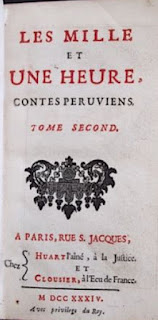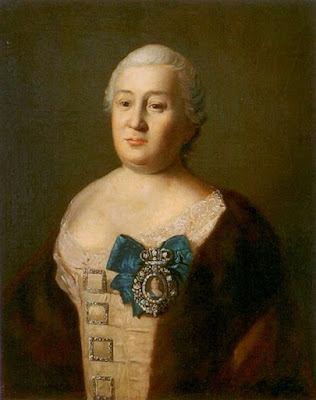001bis. Marusja Čuraj / Маруся Чурай

Remember Marusja Čuraj, the legendary folk heroine who was the subject of our first post? Her reputation in Ukrainian literature and culture would seem to be based upon the enormous popularity that she garnered in the romantic era when Marusja was featured in several literary works, including a tale in Ukrainian by H. F. Kvitka-Osnovjanenko (1834) and one in Russian by A. A. Šachovskoj (1839). Marusja was also the subject of a children's story authored by the well-known woman writer "Marko Vovčok" (a pseudonym for Marija Aleksandrovna Markovič, née Vilinskaja, 1833-1907). Her tale, entitled "Marusja" (1871) was widely translated. This is the cover of the French edition (1878) – from which Vovčok's own name was omitted!
O, students, so many projects come to mind! Why not research the context of this story's writing and publication, for example? Was it really written in Paris in the 1860s – and in Ukrainian – as alleged on the Ukrainian Wikipedia page dedicated to it? Certainly, Marko Vovčok, the "Russian George Sand", wrote in both Russian and Ukrainian, and often on Ukrainian themes, but why did she publish this tale only in 1872 – in Petersburg and in Russian translation?
Another topic for study might be the specific image of Marusja that emerges from this tale. In what ways is she depicted as a symbol for Ukrainian national pride? And why was she an interesting figure for Marko Vovčok? Does the character of Marusja in this text build on or differ from those found in other stories about her? Is it Vovčok who argues that Marusja was the first women writer in Russian tradition and/or does she emphasize Marusja's political significance?
I would like to thank my student, Valerija Plishchenko, whose undergraduate thesis on Marko Vovčok brought her version of the Marusja myth to my attention.
NOTES:
[1] Jane Costlow, "Marko Vovčok", in Dictionary of Russian Women Writers, ed. Marina Ledkovsky, Charlotte Rosenthal, Mary Zirin (Westport, Conn.: Greenwood Press, 1994), 730-33.
ILLUSTRATIONS:
1. The cover of the French translation of Marko Vovčok's Marusja (1878).
2. The frontispiece of Marko Vovčok's Marusja (St. Petersburg, 1872).




Comments
Post a Comment